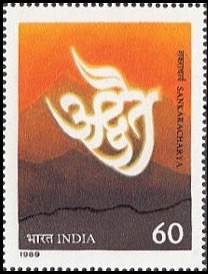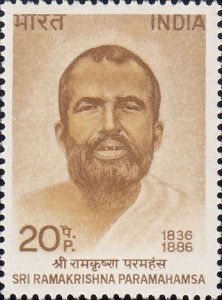
Sankaracharya had a certain disciple, who served him long without receiving any teaching.
One day, hearing footsteps behind him he asked, “Who is there?” and was answered by this disciple, “It is I.”
Then said the Master, “If this I is so dear to you, either stretch it to the infinite or renounce it altogether.”
– Tales and Parables of Sri Ramakrishna Paramahamsa
Adi Shankaracharya ( First Shankaracharya, around 8th century CE) was an Indian Vedic scholar and teacher (acharya). Shankara is most known for his systematic reviews and commentaries (bhashya) on ancient Indian texts. His many works present a harmonising reading of the shastras, with liberating knowledge of the self at its core, synthesising the Advaita Vedanta teachings of his time.
Image: A commemorative postage stamp on Sri Shankaracharya was released by India in 1989 displaying a stylised design of the word “Advaita” in Hindi. Courtesy, https://sanskritonstamps.blogspot.com/

Sri Ramakrishna Paramahamsa (1836-1886) was a Hindu mystic from India whose parable-based teachings espoused the ultimate unity of diverse religions as being means to enable the realisation of the same God. After his demise, his chief disciple Swami Vivekananda popularised his ideas and founded the Ramakrishna Order, which provides spiritual training for monastics and householder devotees, and the Ramakrishna Mission, which is involved in charity, social work and education.
